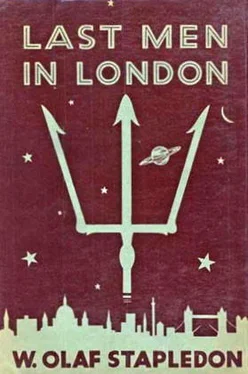By now Paul, having bound up his hand, having wiped his knife and put it away, had risen to his feet, and was walking towards home with trembling knees, pursuing his argument.
‘To make the music that spirit is, that, I now see, is the end for which all living things exist, from the humblest to the most exalted. In two ways they make it: gloriously, Purposefully, in their loyal strivings, but also shamefully, unwittingly, in their betrayals. Without Satan, with God only, how poor a universe, how trite a music! Purposefully to contribute to the music that spirit is, this is the great beatitude. It is permitted only to the elect. But the damned also, even they, contribute, though unwittingly. Purposefully to contribute upon the strings of one’s own being, and also to respond with ecstasy to the great cosmic theme inflooding from all other instruments, this is indeed the sum of duty, and of beatitude. Though in my own conduct I were to betray the music which is spirit, and in my own heart dishonour it, yet seemingly it is not in reality sullied; for it dare avail itself alike of Christ and Judas. Yet must I not betray it, not dishonour it. Yet if I do, it will not be sullied. Mystery! Purposefully to make the music that spirit is, and to delight in it! The delighting and suffering of all minded beings are within the music. Even this very profound, very still delight, this ecstasy, with which I now contemplate my hand’s pain and Katherine’s distress and the long effort and agony of the worlds, this also is a contribution to the music which it contemplates. Why am I thus chosen? I do not know. But it is irrelevant that this instrument rather than that should sound this theme and not another, create this ecstasy and not that agony. What matters is the music, that it should unfold itself through the ages, and be fulfilled in whatever end is fitting, and crowned with admiration, worship. But if it should never be rightly fulfilled, and never meetly crowned? I have indeed a very clear conviction that over the head of time the whole music of the cosmos is all the while a fulfilled perfection, the eternal outcome of the past, the present and the future. But if I am mistaken? Then if it is not perfected, it is at least very excellent. For this much my eyes have seen.’
He was now coming down the slope toward the street lamps and lighted windows. On the other side of the little valley the water-tower of the lunatic asylum rose black against the sky. He stood for a while. At that moment a faint sound came to him from across the valley. Was it a cat? Or had a dog been run over? Or was it a human sound between laughter and horror? To Paul it came as the asylum’s comment on his meditation. Or was it the comment of the whole modern age? For a while, he kept silent, then said aloud, ‘Yes, you may be right. Perhaps it is I that am mad. But if so this madness is better than sanity. Better, and more sane.’
On the following day Paul wrote a poem. It reveals the blend of intuitive exaltation and metaphysical perplexity in which he now found himself.
When a man salutes the perfection of reality
Peace invades him,
as though upon the completion of some high duty
as though his life’s task
were achieved in this act of loyalty
Was the task illusory?
Is this beatitude but the complacency of self-expansion?
Or does the real, perfect formally,
yet claim for its justification and fulfilment admiration?
As a man’s love transmutes a woman,
kindling her features with an inner radiance,
does mind’s worship transfigure the world?
Chapter 8
THE MODERN WORLD
1. PAUL UNDERTAKES HIS TASK
WITH this spiritual achievement solidly accomplished, Paul was ready to observe London and the world with new eyes. In fact he was now well fitted to carry out the main work that I had purposed for him. He himself would have been content simply to carry on his teaching with new vitality and conscientiousness, and for the rest to pursue with deeper understanding his leisurely tour of the countries of the mind. But he was soon to discover that more was demanded of him, and that he who had so lately learned the lesson of quietness, must now embark on a life more active, more resolute, than anything that he had formerly attempted.
His new purpose dawned on him slowly, and as it became clear to him and formidable, he both lusted in it and feared it. His final and precise apprehension of it flashed upon him as he was waiting on the top of a stationary and throbbing motor-omnibus outside the great railway terminus of Cannon Street, watching the streams of bowlered or soft-hatted business men, hurrying to their offices. There surged through him suddenly a violent hunger, or was it a sacred call, to apprehend precisely and with understanding the whole phenomenon of the modern world, to see it in relation to his recent vision, to discover its deeper significance. So insistent was this new craving that he had to restrain himself from descending there and then into the street to ask each of the crowd in turn what he was really doing with his life, and why.
Paul was frightened by the violence of his own desire, and by its quality of freakishness, even of insanity. He pulled himself together and argued against it. It would interfere with his own work, and with his peace of mind. He was not fitted for any such world-study. Moreover, he ought not to give up his life to merely apprehending; he must do, must serve. However well he should understand, the world would be none the better.
As the days passed, however, this new craving took firmer hold of him. He felt it growing into an irresistible, an insane obsession. So violently did he strive to exorcize it, that he was threatened with breakdown. Clearly, if he were forced to pursue my purpose against this desperate reluctance, he would pursue it ill. I therefore decided that, in order to gain his willing co-operation, I must attempt to give him a frank and precise explanation of my relations with him. This would be a difficult undertaking, and one which would have been impossible to carry out on any but a carefully selected and prepared individual.
One night, as Paul was lying in bed, I constructed in his imagination a detailed image of myself as I should have appeared to his eyes. He saw me as a great grey human monolith, snake-eyed. I then spoke to him, through his own imagination. I explained that I was a human being of the remote future, living upon Neptune, and that it was my task to study the Terrestrial ages of Man. For this work, I said, I had chosen him as my instrument. If necessary I could by an inner compulsion force him to work for me, but the work would fare better if he would enter into it willingly. I explained that, by helping me to render something of Terrestrial history into the consciousness of my own species, which, I said, was mentally far more advanced than his own, he would be serving not only me but his own kind.
Next morning Paul recalled the night’s experience with amazement, but dismissed it as a dream. On succeeding nights I influenced him again, giving him more detail of my world and my power over himself. I referred him, moreover, to two books. One of these, already published, was An Experiment with Time, by J. W. Dunne, This work, I told him, though to the Neptunian mind it was philosophically naive, might help him to understand the incursion of future events into the present. The other book, which would be called Last and First Men, had yet to appear.
When Paul encountered the first of these books, he was profoundly disturbed, and still more so when, some months later, he read the other in manuscript. He now became convinced of the reality of my intercourse with him. For a while he was terrified and revolted at the knowledge that another human mind had access to his every thought, and could even induce him to think and desire as it was not in his own nature to think and desire. That his character should be largely the product of another mind seemed to him at first an intolerable violation of his privacy, nay, of his identity. I had therefore to remind him, patiently and night by night, that even apart from my power over him he was an expression of influences other than himself, that whatever was distinctive of him was not truly his at all. ‘You forget’, I said, ‘that your nature is the product of an infinite mesh of causes; of evolution, of the hither-thither turmoil of human history, and finally of your parents, of Katherine, of the war, and of your boys. Will you then rebel because yet another influence, hitherto unsuspected, is discovered to have part in you, an influence, too, which has very greatly increased your spiritual stature? If so, your recent illumination on the Down was less deep than it should have been. You have not realized in your heart that the bare private individuality is a negligible thing, that what is glorious or base is the form which circumstance imposes on it. I myself am in the same case with you. I am the product of a vast web of circumstance, and my mind is probably open to the critical inspection and even the influence of I know not what beings superior to myself. Compared with you I am indeed of a higher order of mentality, but no credit is due to me for this greater richness and significance of my nature. As well might the concluding chord of a symphony take credit for the significance poured into it by all its predecessors. There is of course in both of us, and in all men, and all living things, and all sub-vital beings, the one universal miracle of spontaneous doing, which is the essential life of all existence. Through the aid or the limitation of circumstance some may do much, others little. What matter which of us does which? All the tones of the music are needed for the music’s perfection. And it is the music alone that matters, not the glorification of this instrument or that.’
Читать дальше












